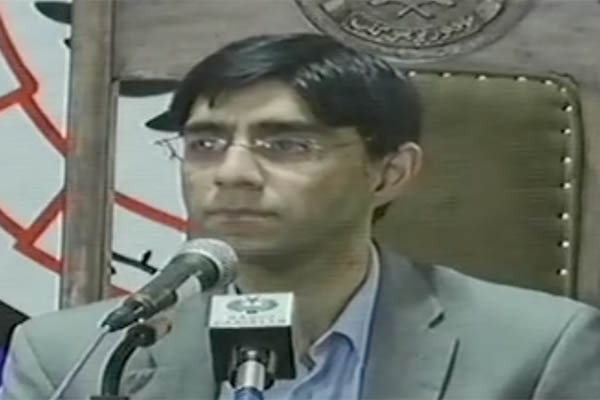
File photo. YouTube
National security adviser says Islamabad and Washington need to work together to counter the worsening security situation in Afghanistan
The use of Afghan soil against Pakistan is a “serious concern” that needs to be brought to a halt, National Security Adviser Moeed Yusuf said on Sunday, as he stressed upon the importance for Islamabad and Washington to work “closely” together in the wake of the complete withdrawal of foreign troops from Afghanistan.
“No nation can work on shared threats in the region—such as instability in Afghanistan—other than Pakistan and the U.S.,” he told a press conference at the Pakistan Embassy in Washington, D.C. where he is currently on an official visit. Highlighting the security threats to Pakistan emanating from Afghanistan, he cited the Tehreek-e-Taliban Pakistan, adding that there were also groups based in Afghanistan that posed threats to regions that represented U.S. interests.
Both Pakistan and the U.S. can jointly address this, he claimed. “There has been a positive response on the collaboration between U.S. and Pakistan. Political reconciliation in Afghanistan is a major step that could be taken and would help reduce pressure,” he said, claiming that peace in Afghanistan would strengthen Pakistan, not weaken it, as no other country—apart from the war-torn state—had suffered as much from instability there.
During his media interaction, the NSA said he had traveled to the U.S. to follow-up on an earlier meeting with his U.S. counterpart, Jake Sullivan. He said Afghanistan had remained the most immediate and important topic of discussion, adding that Pakistan and the U.S. had nonetheless agreed to work together in multiple domains, including climate change, health and COVID-19, commerce and investment.
Yusuf said the latest round of meetings in Washington had resulted in both countries agreeing on the importance of collaboration to tackle regional challenges. “We got a positive response for moving forward,” he said, adding that only issues concerning Pakistan were discussed during official engagements. “We decided that we would work on substance rather than optics at this point because in this relationship there was expectation-reality disconnect and we recently publicly thanked the U.S. for vaccine doses it donated, which underscored our commitment toward the bilateral ties,” he said.
Afghan refugees
The NSA reiterated that Pakistan could not economically bear the burden of anymore refugees from Afghanistan and was in favor of them being displaced from their homes. “Pakistan is doing whatever it can, and will do further, but Afghan forces have to decide their future whereas the U.S. leadership can facilitate and should take political leadership onboard,” he said, adding a critical question was the economic plan the world had for Afghanistan.
“Pakistan and the U.S. can work in this field as the China-Pakistan Economic Corridor can be extended to Afghanistan, and manufacturing plants could be set up near border to use Afghan raw materials for export-goods that would ultimately benefit Afghans,” he said. He also referred to Prime Minister Imran Khan’s stated desire to use Afghanistan as a connecting point to Central Asian Republics, stressing this was only possible through peace and stability.
To a question, he noted that right now there was no bar on Afghanistan’s exports through Pakistan. Even Indian goods bound for Afghanistan are allowed through the Karachi Port, he said. The land route, he stressed, could not be implemented as Pakistan felt India posed a national security threat, adding that it was unfortunate that India was ruled by an ideologically motivated government that actively pursued Hindutva ideology.
To another question, he accused India of funding terrorism in Pakistan, adding that a dossier on this had already been presented to the global community. “The world, including the U.S., is saying we are together in the fight against terrorism but incidents of terrorism [targeting Pakistan] have increased unfortunately,” he said.
The NSA said Pakistan had a two-fold strategy: blocking undesirable movement across the international border through fencing, and a dignified repatriation of Afghan refugees. “Anything to be decided by Afghanistan is their decision and any movement or event there has nothing to do with us,” he said. “Dignified repatriation of Afghan refugees is a must, and Pakistan has given the most hospitable refuge to migrants. They have the right to return; an overwhelming majority of Afghan refugees are law abiding whereas certain elements take benefit of that to propagate against us,” he claimed.
